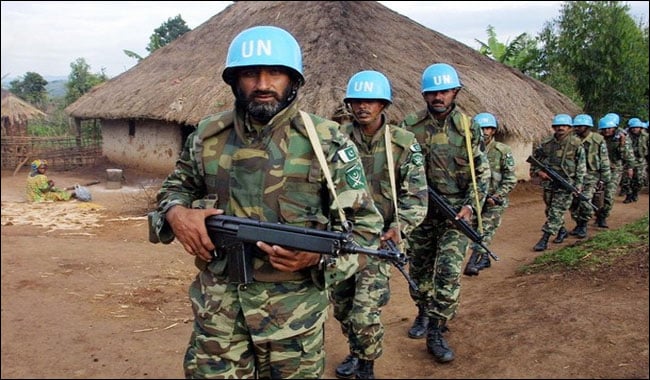by Muhammad Mohsin Iqbal
Pakistan has played an integral role in global peacekeeping efforts, particularly through its participation in United Nations peacekeeping missions. This commitment to peace and stability across the world has become a hallmark of Pakistan’s foreign policy and an expression of its moral and religious values. The dedication, professionalism, and sacrifice of the Pakistan Armed Forces have earned them global recognition and respect.
Since its independence, Pakistan has maintained a strong presence in the international community, with its armed forces consistently participating in peacekeeping operations under the United Nations’ banner. The country first began contributing troops to UN peacekeeping missions in 1960 during the Congo Crisis. Over the decades, Pakistan’s military personnel have served in some of the most conflict-ridden regions of the world, from the Balkans to Africa, and from the Middle East to Asia. The commitment remains unwavering as Pakistan continues to be one of the largest contributorsi to UN peacekeeping operations.
Pakistan’s armed forces, particularly the army, have participated in a vast number of peacekeeping missions. These include deployments in conflict zones such as Congo, Somalia, Sierra Leone, Haiti, , Kosovo, Darfur, Bosnia-Herzegovina, Burundi, Cambodia, East Timor and many other countries. The role of the armed forces in these missions varies from providing security and support to maintaining law and order and assisting in humanitarian efforts. The goal is to create an environment where peace can be restored, allowing civilians to rebuild their lives after devastating conflicts. Over the years, Pakistan has contributed more than 200,000 personnel to 46 missions in 28 countries.
One of the most significant aspects of Pakistan’s contributions is the sacrifice made by its soldiers. Peacekeeping is a dangerous and demanding task, requiring personnel to operate in hostile environments, often under difficult conditions. Pakistan has made substantial sacrifices in this regard. As of today, more than 170 Pakistani soldiers have laid down their lives while serving in peacekeeping missions, making Pakistan one of the highest contributors of personnel and martyrs in the UN peacekeeping forces. These soldiers represent the highest ideals of service, sacrifice, and dedication to global peace.
Pakistan’s role in global peacekeeping is not limited to its male soldiers. Women in the Pakistan Armed Forces have also made significant contributions, particularly in the medical field, where they provide essential services to both peacekeepers and civilians in conflict zones. The involvement of women in peacekeeping operations not only enhances the operational effectiveness of missions but also aligns with the United Nations’ objective of promoting gender equality in peace efforts.
The United Nations peacekeeping missions are designed to restore peace and stability in conflict zones by deploying military, police, and civilian personnel from various member states. While participation in these missions is voluntary, it is seen as a responsibility shared by all member countries to ensure global stability. The UN Charter does not mandate compulsory participation in peacekeeping missions for all nations. However, as a member of the international community, countries are expected to contribute in some capacity, either through financial support or by sending troops. For many nations, including Pakistan, participation in these missions is both an international duty and a demonstration of their commitment to world peace.
Pakistan’s commitment to peacekeeping is also deeply rooted in its Islamic values, which emphasize peace, justice, and harmony among people. Islam promotes the idea of peace as a fundamental principle. In the Holy Quran, it is stated, “And if they incline to peace, then incline to it [also] and rely upon Allah” (Surah Al-Anfal, 8:61). This verse highlights the importance of striving for peace and engaging in efforts to bring an end to conflict. In another verse of the Holy Quran, it is stated, “Whoever saves a life, it is as if they saved all of humanity” (Surah Al-Ma’idah, 5:32). This powerful verse aligns with the selfless efforts of Pakistan’s armed forces, both men and women, as they work to restore peace and heal the wounds of conflict across the globe. Similarly, the Prophet Muhammad (PBUH) emphasized the value of peace and reconciliation throughout his life. He sought peaceful resolutions to disputes, even in the face of adversity, and encouraged his followers to foster harmony and avoid conflict whenever possible.
In the Hadith, the Prophet (PBUH) said, “Shall I not inform you of something more excellent than fasting, prayer, and almsgiving? It is putting things right between people, spoiling relations is the shaver (i.e., it erases good deeds).” This saying underscores the significance of fostering peace and resolving conflicts, showing that peacebuilding is considered one of the highest acts of worship in Islam.
Pakistan’s participation in peacekeeping missions can be seen as a practical application of these values. By contributing to international peace and security, Pakistan’s armed forces are not only fulfilling their global responsibilities but also aligning their actions with the Islamic principles of peace and justice. Their role in peacekeeping missions is, therefore, both a national duty and a religious obligation.
In conclusion, Pakistan’s role in UN peacekeeping missions is a testament to its commitment to global peace and stability. The bravery and sacrifice of the Pakistan Armed Forces in these missions reflect the country’s dedication to promoting peace in some of the world’s most volatile regions. With more than 170 martyrs and a legacy of participation in 46 missions, Pakistan stands tall among the nations striving for a peaceful world. Through these efforts, the country not only strengthens its international standing but also upholds the Islamic values of peace, reconciliation, and justice. While participation in peacekeeping missions is not mandatory for all countries, Pakistan’s consistent involvement demonstrates its deep-seated belief in the importance of peacebuilding, both as a member of the international community and as a nation guided by Islamic teachings.



Comments are closed.